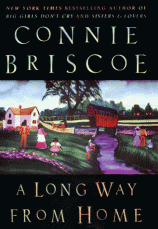Reading Group Guide
Discussion Questions
A Long Way From Home

1. The author sets her fictional characters among historical figures and events. How does this technique affect your reaction to the story?
2. As a girl, Clara is critical of her mama's placid behavior, of her seeming acceptance of their life in slavery. Yet years later, when Clara is head of the house slaves in the Montgomery household, Clara's daughter Susan has the same criticism of Clara. What makes Clara, once so rebellious, reach a similar state of acceptance as her mama?
3. Parts I and II are told by two different narrators, Clara and her daughter Susan. Though they are a generation apart, their lives have many parallels. Both worked in the households of wealthy white families and enjoyed certain privileges. And both rejected a possible turning point in their lives: Clara declines her father's offer to "run" with him, and Susan, sitting in the Richmond train station with money stolen from Miss Lizbeth, changes her mind and returns to the Montgomery house. What kept them from running? What might their futures have held if they had carried out their plans for escape?
4. The author writes of an "invisible mask" that slaves pull over their faces when speaking and acting before white people. What kind of behavior is the mask hiding? What is it projecting?
5. As Susan is chained to a wagon and wrenched from her family, her mother valiantly tries to give her a string of blue beads that belonged to Grandmother Squire. What does the shattering of the beads signify? What objects in our own lives convey a sense of family unity?
6. When Susan's name is changed to Suzanne for her owners' convenience, she feels this insult above all else. What significances is attached to a name? Does her acceptance of this new name reflect a defeated spirit? How would we react if our employers requested us to change our names?
7. Susanne witnesses Oliver's forcible removal from a public park for lack of the "proper papers" and sees his humiliation. She reflects that Oliver, a free man, is not so different from her --he is merely a "slave without a master". How does society limit a person's freedoms even when the law has freed them? Does today's society continue to restrict its black citizens?
8. Many of the slaves are conflicted about pursuing their freedom. What are some of the things they feared would be lost with the gain of freedom? Was it more difficult for a slave like Susan, living amidst wealth and privilege, to see the gains of freedom? What convinces her that a free life is the life she must live?
9. The slaves were forbidden to learn to read. Why did slave-owners fear the literacy of their slaves? How would communication among the slaves challenge the power of the slaveholders? What other ways were the slaves kept dependent?
10. The pre-Civil War South housed an obvious division between whites and blacks. More subtle divisions existed between house slaves and field slaves, between country slaves and city slaves, between American-born blacks and African-born blacks. Besides color, what are some of the prejudices that divide people in our society today?
A Long Way From Home
- Publication Date: July 7, 1999
- Genres: African American Interest, Fiction, Historical Fiction
- Hardcover: 368 pages
- Publisher: Harper
- ISBN-10: 0060172789
- ISBN-13: 9780060172787







